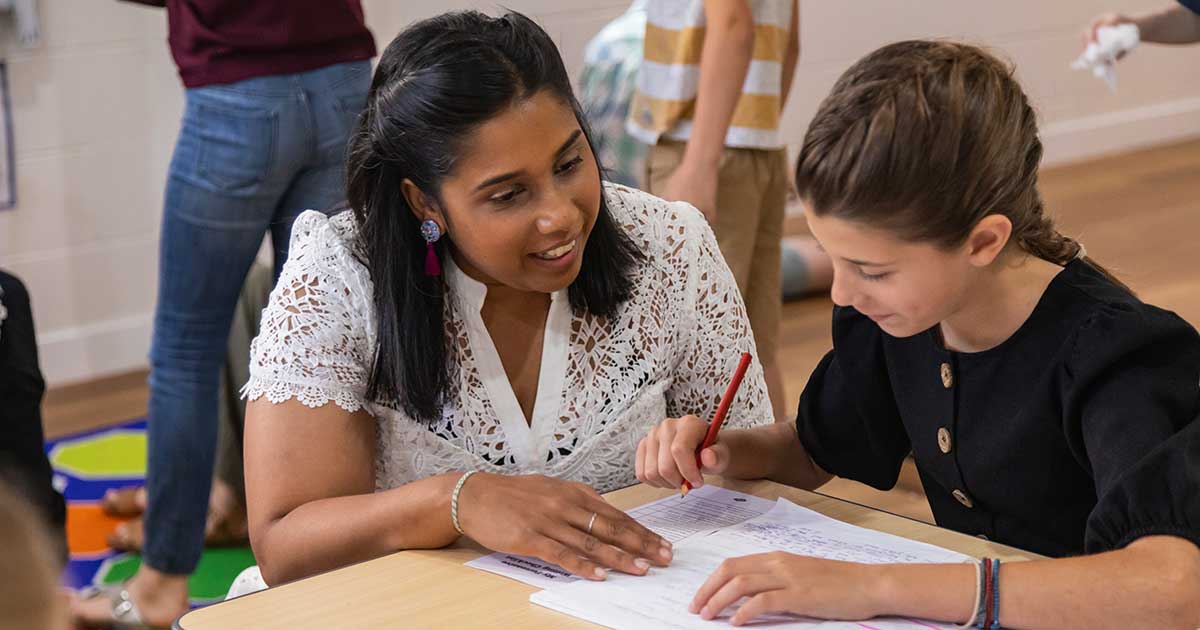Top 10 Concepts About a ‘Growth Mindset’
26 November 2021
Here are some ideas to get you started thinking about Growth Mindset. Are you wondering about how this might apply to your child and their learning?
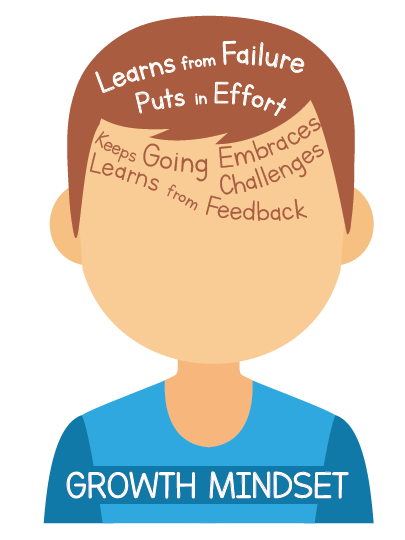 Growth Mindset vs. Fixed Mindset
Growth Mindset vs. Fixed Mindset
Carol Dweck (a psychologist at Stanford University) pioneered the research on motivation and personality. She conducted many studies, particularly based on students to see how they coped when faced with a challenge. She discovered that talent and ability had little to do with long-term success instead the difference in results were attributed to a ‘growth mindset’, as opposed to a ‘fixed mindset’.
A ‘fixed mindset’ can have a drastic effect on children’s learning as they may mentally switch off, become disinterested, anxious or display a variety of unsettled behaviour as soon as something they perceive as difficult is presented to them. Without even attempting a task, and even if the task is within their abilities, the child will experience a block that will prevent their learning from growing.
Children with a growth mindset believe that talents and abilities are developed when they challenge themselves and put in the work. People with a growth mindset work to improve themselves and enjoy the learning process. Having a growth mindset involves the belief that even if you find something difficult now, it won’t always be that way.
The good news is that developing a growth mindset, in children, can be learnt using several simple and easy to apply concepts.
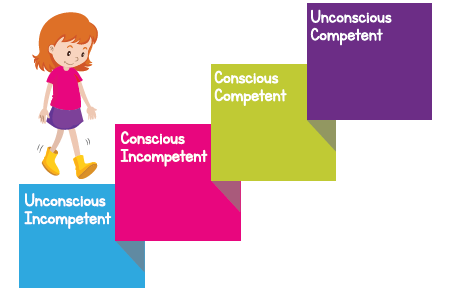 1. The Four Steps in Learning
1. The Four Steps in Learning
Identifying where your child is at on The Four Steps in Learning can help you understand the process we all go through and can assist you in understanding the emotions your child may be experiencing. For a child, realising you are not able to do something (‘consciously incompetent’) can come along with a raft of negative emotions.
The first step of The Four Steps in Learning Model is the Unconscious Incompetent phase where the teacher and parents gather information on how their child learns. Some children in the Unconsciously Incompetent phase have a Growth Mindset and naturally feel like they just haven’t learnt it ‘yet’. The other side of the coin is that children are unable to use their words and use their behaviour and emotions to let you know that something isn’t quite right. At this stage, as a parent, we become concerned and move into the Consciously Incompetent stage, where you start to research and locate a tutoring service for your child to be successful. Deep down you know that the role of the parent is to parent and the role of the teacher is to teach.
Seeds of Knowledge can help your child move to the next two phases: Conscience Competence and, the ultimate goal, Unconscious Competence. Here they transfer their knowledge and learning to every situation that arises.
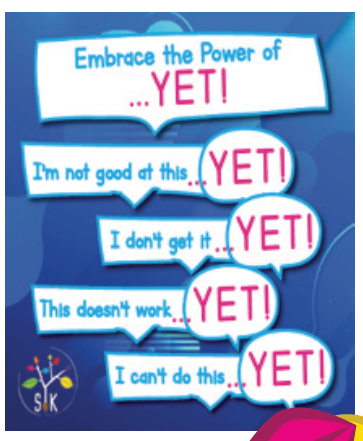 2. The Power of Yet
2. The Power of Yet
The Power of Yet is an important component of having a Growth Mindset. This concept involves the belief that even if you find something difficult now, it is not impossible in the future. That is very powerful! When children use the words “Not Yet” they understand that they are on a learning curve and moving towards their goals.
Seeds of Knowledge explicitly teaches these powerful Growth Mindset Concepts. It is through our Learning to Learn Program that we teach this Growth Mindset concept and it is through understanding the brain that the children are able to put the concept into practise.
3. Understanding How Your Brain Works
Every learning experience that children have creates new neural connections. Learning and practise consolidate and strengthen the neural connections in our brain. Teaching children that their brains are like puzzles, that sometimes have missing pieces, can be a helpful way to explain this abstract concept to them. This also helps them to understand that not knowing how to do something is a part of the learning process.
4. The Importance of Making Mistakes
When your child understands that making mistakes is essential to the learning process, learning becomes enjoyable. This understanding builds amazing learning resilience, confidence and all-round happiness. At this stage your child has made a learning leap from Conscience Incompetent to Conscious Competence, they have a clear understanding of the learning process.
5. Mapping Out Goals
At this stage the children are now ready to map out their goals to reach the Unconsciously Competent phase. This is the perfect time for parents to create tutoring goals with their children. Start research SMART goals as it is important for the goals to be Specific, Measurable, Achievable, Realistic and Timely.
6. Staying Focused on Yourself
Have you noticed your child comparing themselves and/or their academic progress to others? At Seeds of Knowledge, we recognise this as unhelpful as well as slowing progress. The important message is for your child to develop self-awareness and bring them back to staying focused on themselves and their goals. This is why at Seeds of Knowledge we explicitly teach children about the Learning Pit and help them understand where they are on the Learning Pit.
7. The Learning Pit
The Learning Pit is a process that children go through when learning something new. Children learn to recognise that when they are learning a new skill they always start at the top of the pit. When children have learnt this skill they no longer go right down to the bottom of the pit, however are able to confidently go from one side to the other or are able to climb out of the pit at any stage.
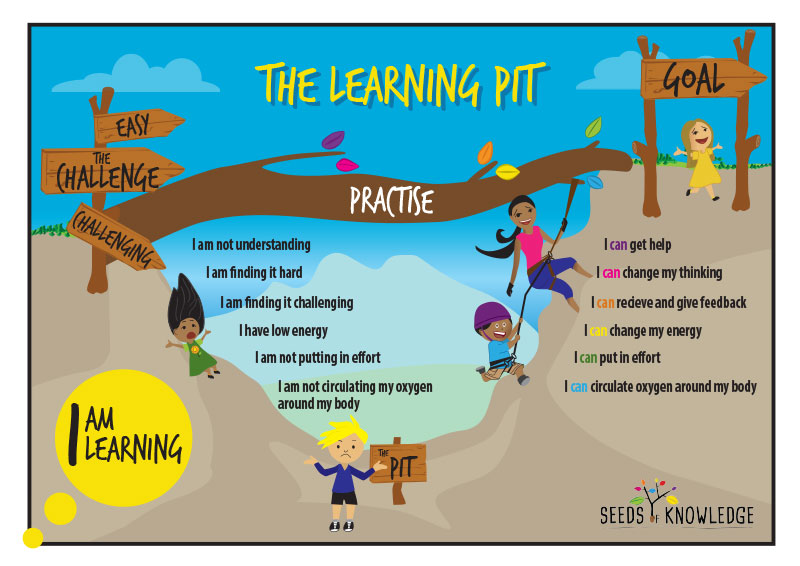
However, when this skill has not been learnt yet, children feel disempowered, hopeless and use negative self-talk. This is a signal that all is not going well. All of a sudden, they end up at the bottom of the pit. At Seeds of Knowledge we avoid this at every opportunity, but at times we use it as a learning tool for children to identify and develop self-awareness as to where they are in the pit. At this point we teach the children strategies to effectively and successfully get out of the pit. Some of these strategies include positive self-talk, receiving feedback, putting in effort and therefore becoming empowered. Children learn to love learning!
8. Cultivating Positive Self-Talk
“Positive thinking will let you do everything better than negative thinking will” – Zig Ziglar
Children with the ability to think positively will have a greater understanding of life. They will be able to see the positives of every situation and experience they have in life. Our brain naturally defaults to the negative. Children who can use positive language have learnt the ability to switch from negative to positive. This means that children have learnt this skill of positive self-talk. Children who use negative self-talk have not learnt this skill or the power of YET.
9. Power of Feedback
Feedback is an essential part of effective teaching and learning. It helps children understand what they have accomplished so far and gives them clear steps to follow to continue to improve. When children are not used to the concept of feedback it can sound like criticism and when this occurs the children are not able to access the feedback. When learning to give you child/ren feedback use the language of feedback, for example, “I’m giving you some feedback on your work as I know you can improve on what you _____.” This tunes in the child and they become ready to take on the feedback. Feedback needs to be seen and given as a regular part of the learning process. Children will then start asking and giving feedback. This is when you know the power of feedback is in action.
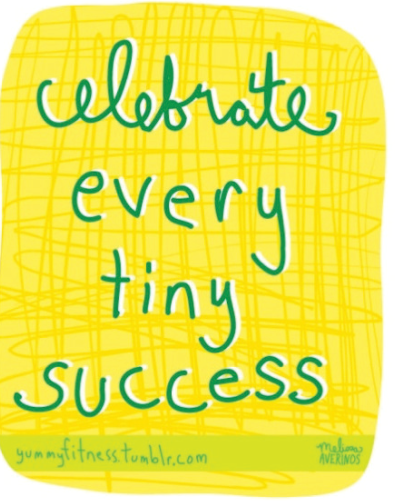 10. The Language of “Success”
10. The Language of “Success”
It is essential that we celebrate every tiny success, as this is achievement in action. As parents it is important to demonstrate that learning is a natural part of life. When we celebrate the success and effort of learning children want to learn more. By discussing the success with your child and helping them feel positive about their effort and achievement this will become a part of the internal thought processes as they see themselves as life-long learners. Success for every child is different and the goal is to view success through the child’s eye.
Exploring the language of “success” with your child is a vital part of Growth Mindset. Check in with your child and have a conversation about what success is for them.
If you would like to know how Seeds of Knowledge can help your child develop a Growth Mindset, check out our Learning to Learn program.
Yours in learning,
Lasni
FREE Printable Power of Thought Cards
Simply print and display on the fridge, on your child’s room or in their lunchbox
Download our free guide
Supercharging Struggling Learners
Key signs your child might be struggling with their learning:
- frustration
- lack of focus
- low energy or a lack of effort
- negative body language
Learning is challenging and hard. It is important for you and your child to recognise that as part of the learning process, accept it and push through it. This free guide will help you navigate these challenges and supercharge your struggling learner.
Don’t wait any longer. Download it today.
Tutoring and tutors for primary school children in English and Maths.
Fairfield
Christian Family Teaching Rooms
51 Cross Street, Fairfield Q 4103
Access the teaching rooms at the rear of the carpark off Sunbeam Street
Carina
The Salvation Army Teaching Space
202 Gallipoli Road Q Carina Heights
